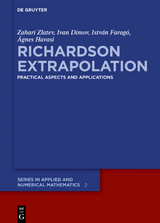Richardson Extrapolation
Practical Aspects and Applications
Seiten
The series is devoted to the publication of high-level monographs and specialized graduate texts which cover the whole spectrum of applied mathematics, including its numerical aspects. The focus of the series is on the interplay between mathematical and numerical analysis, and also on its applications to mathematical models in the physical and life sciences.
Scientists and engineers are mainly using Richardson extrapolation as a computational tool for increasing the accuracy of various numerical algorithms for the treatment of systems of ordinary and partial differential equations and for improving the computational efficiency of the solution process by the automatic variation of the time-stepsizes. A third issue, the stability of the computations, is very often the most important one and, therefore, it is the major topic studied in all chapters of this book.Clear explanations and many examples make this text an easy-to-follow handbook for applied mathematicians, physicists and engineers working with scientific models based on differential equations. ContentsThe basic properties of Richardson extrapolationRichardson extrapolation for explicit Runge-Kutta methodsLinear multistep and predictor-corrector methodsRichardson extrapolation for some implicit methodsRichardson extrapolation for splitting techniquesRichardson extrapolation for advection problemsRichardson extrapolation for some other problemsGeneral conclusions
Scientists and engineers are mainly using Richardson extrapolation as a computational tool for increasing the accuracy of various numerical algorithms for the treatment of systems of ordinary and partial differential equations and for improving the computational efficiency of the solution process by the automatic variation of the time-stepsizes. A third issue, the stability of the computations, is very often the most important one and, therefore, it is the major topic studied in all chapters of this book.Clear explanations and many examples make this text an easy-to-follow handbook for applied mathematicians, physicists and engineers working with scientific models based on differential equations. ContentsThe basic properties of Richardson extrapolationRichardson extrapolation for explicit Runge-Kutta methodsLinear multistep and predictor-corrector methodsRichardson extrapolation for some implicit methodsRichardson extrapolation for splitting techniquesRichardson extrapolation for advection problemsRichardson extrapolation for some other problemsGeneral conclusions
Z. Zlatev, Aarhus Univ., Denmark; I. Dimov, Bulgarian Acad. of Sci., Bulgaria; I. Faragó and Á. Havasi, Eötvös Loránd Univ., Hungary.
| Erscheinungsdatum | 14.11.2017 |
|---|---|
| Reihe/Serie | De Gruyter Series in Applied and Numerical Mathematics ; 2 |
| Zusatzinfo | 22 b/w and 16 col. ill., 73 b/w tbl. |
| Verlagsort | Berlin/Boston |
| Sprache | englisch |
| Maße | 170 x 240 mm |
| Gewicht | 659 g |
| Themenwelt | Mathematik / Informatik ► Mathematik ► Analysis |
| Schlagworte | Differentialgleichung • Extrapolation • Numerisches Verfahren • Operator-Splitting-Verfahren • Runge-Kutta-Verfahren |
| ISBN-13 | 9783110516494 / 9783110516494 |
| Zustand | Neuware |
| Informationen gemäß Produktsicherheitsverordnung (GPSR) | |
| Haben Sie eine Frage zum Produkt? |
Mehr entdecken
aus dem Bereich
aus dem Bereich
Festigkeits- und Verformungslehre, Baudynamik, Wärmeübertragung, …
Buch | Hardcover (2025)
De Gruyter Oldenbourg (Verlag)
CHF 125,90




